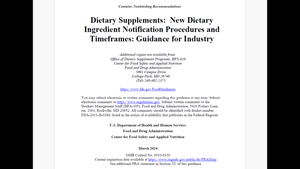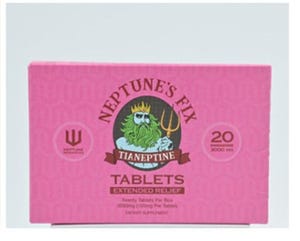FDA releases guidance in effort to boost NDI submissions
FDA released a draft guidance that when finalized is intended to increase the number of safety-related notifications it receives for novel ingredients in dietary supplements.
.png?width=850&auto=webp&quality=95&format=jpg&disable=upscale)
Forty six hundred.
That’s the number of new dietary ingredient notifications (NDINs) that should have been submitted to FDA since passage of the Dietary Supplement Health and Education Act of 1994 (DSHEA), according to an estimate from an FDA official three years ago.
FDA, however, has only received around 1,200 total notifications since the law’s enactment.
On Thursday, FDA released a draft guidance that—if all goes well—could change that. The document’s objective, when finalized, is to encourage distributors and manufacturers of dietary supplements to remedy past failures to submit pre-market ingredient notifications to FDA.
The NDIN requirement in DSHEA is aimed to ensure novel ingredients are “reasonably” expected to be safe and represents a critical piece of FDA’s oversight of the market since it’s the agency’s only chance to review the safety of NDIs in supplements before they’re sold to consumers.
“To increase the amount of safety information we have about NDI-containing dietary supplements in the marketplace and to promote risk-based regulation, we are informing manufacturers, distributors and other interested persons of our intent to exercise enforcement discretion, for a limited time and in limited circumstances, to encourage firms to correct past failures to submit an NDI notification,” FDA disclosed in the draft guidance.
If the guidance produces its intended effect, FDA will have greater visibility into the identity and safety of novel ingredients marketed in supplements. FDA said this result will put it in a better spot to prioritize its enforcement efforts and shield consumers against products that fail to meet relevant safety standards.
“We remain committed to a flexible framework for dietary supplements that ensures the safety of these products for consumers,” said Cara Welch, Ph.D., director of FDA's Office of Dietary Supplement Programs (ODSP), in a press release. “The resulting notifications the agency receives through this period of enforcement discretion will help increase the amount of safety information we have about NDI-containing dietary supplements in the marketplace.”
The guidance, when finalized, will represent FDA’s thinking on the topic, although it will neither bind the agency nor the public. Its planned “enforcement discretion policy” does not apply to ingredients that pose a safety hazard to consumers, even if FDA receives a submission, nor does it extend to other regulatory requirements relating to supplements.
“This enforcement discretion policy relates solely to the timing of the requirement to file an NDI notification under section 413(a)(2) of the [Federal Food, Drug & Cosmetic] FD&C Act,” FDA explained in the draft guidance. “In other words, we generally do not intend to take enforcement action based on a failure to comply with the requirement to file an NDI notification in a timely fashion against firms marketing products within the scope of this enforcement discretion policy.”
FDA has requested stakeholders comment on the draft guidance within 60 days of publication in the Federal Register (scheduled for May 20) before it begins work on a final version. The agency said it intends to exercise enforcement discretion for 180 days upon publication of the final guidance, and its policy would only apply to products on the U.S. market as of May 20.
During a May 16, 2019, public meeting on “responsible innovation in dietary supplements,” then ODSP Director Steve Tave said the number of notifications that should have been filed with FDA (roughly 4,600) was a “conservative” estimate. At that time, the agency had received just over 1,100 total notifications.
"So in other words, even using the low end of the estimate for the number of products on the market today, and even assuming ... 90% of the new products that have been introduced were not subject to the requirement for notification, we still find that the number of notifications submitted is less than 25% of where we expect it should be," Tave said, according to FDA's written transcript of his remarks. "And you can quibble with the math, but I think the orders of magnitude are probably fairly accurate. The point is that compliance clearly needs to improve."
FDA in FY21 received 45 NDINs—or premarket ingredient notifications—from supplement companies. That’s a fairly paltry figure, considering FDA estimates the U.S. market contains more than 50,000 dietary supplement products, and perhaps as many as 80,000 or more.
Industry stakeholders and others have articulated many reasons for the relatively low number of submissions to FDA.
Among their theories:
-- FDA does not rigorously enforce against non-compliant firms, decreasing incentives to invest in the safety work and notify FDA.
-- Many small firms and "bad actors" are either unaware of the notification requirement, unprepared to meet it or simply unwilling to do so.
-- Notifying FDA could draw undue attention to a firm in cases where the NDI contains a controversial ingredient, such as hemp-based CBD.
-- And more often than not, companies marketing NDIs in supplements take advantage of an exception in the law to the notification requirement. The exception covers NDIs "present in the food supply as an article used for food in a form in which the food has not been chemically altered."
About the Author(s)
You May Also Like






.png?width=800&auto=webp&quality=80&disable=upscale)